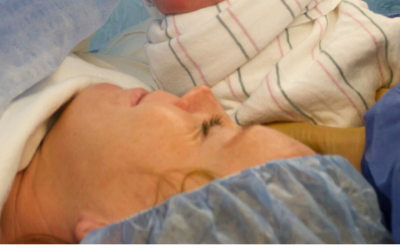
Preeclampsia Foundation-funded genetic research study finds two distinct molecular “faces” of preeclampsia
Amit Zeisel, PhD and Ido Solt, MD and their research team at the Technion – Israel Institute of Technology and Rambam Hospital, together with Prof. Simcha Yagel, MD of Hadassa Hospital, have published new research that provides systematic molecular evidence for two disease pathways for preeclampsia, a life-threatening hypertensive disorder of pregnancy. The research study, which was funded by the Preeclampsia Foundation’s Peter J. Pappas Research grant, used a single-cell transcriptomic survey on cases of early- and late-onset preeclampsia to understand how placental cells were specifically affected by the two forms of the disease.
For this study, single-cell transcriptomic research measured tens of thousands of placental cells, one cell at a time, using single-cell RNA sequencing. By studying the differences between preeclamptic placentas and non-affected placentas, the researchers hoped to better understand the basic, initial mechanisms of the disease.
“Using this state-of-the-art technique, we found that many genes were massively dysregulated in placentas of early-onset preeclampsia, but that was not the case in late-onset patients,” explained Dr. Zeisel. “This is important because it means there is a real molecular basis for two forms of preeclampsia, and that treatments will need to be tailored to these distinct subtypes.”
Single-cell RNA-sequencing allows scientists to see exactly where genetic changes take place on the level of individual cells, and in this case, all the cell types of the placenta. This analysis allows researchers to finally understand the exact source of problematic changes in the placenta related to preeclampsia, even if some had been described before.
“For example, the role of inflammation has been well described in preeclampsia research, but not fully understood,” said Zeisel. “Our study describes the way that specific populations of immune cells from both mother and fetus participate in these inflammatory processes.”
Preeclampsia affects 5-8% of all pregnancies worldwide and is a leading cause of premature birth, as well as maternal and infant illness and death. Preeclampsia can occur as early as 20 weeks gestation and up to six weeks postpartum; other research studies have suggested that there may be differences between the way that patients develop early-onset versus late-onset variations of the disease. Early-onset preeclampsia, which is relatively rare, is high blood pressure during pregnancy with organ dysfunction that requires delivery prior to 34 weeks’ gestation. Zeisel, Solt, and their colleagues have made their data available to other preeclampsia researchers via their lab website.
“Early-onset preeclampsia is of particular interest to researchers because the outcomes of premature birth are often so severe,” said Preeclampsia Foundation CEO Eleni Z. Tsigas. “By funding this particular research study, we can help better understand what makes these two presentations of the disease different to further improved preventions and treatments.”
Named for the infant son of preeclampsia survivor Lauren Pappas and her husband Clement, the Peter J. Pappas grant funding program seeks to award multiple grants each year. The ultimate goal of the program is to drive research that will eliminate the delivery of pre-term babies as an intervention for severe preeclampsia, HELLP syndrome, and related hypertensive disorders of pregnancy.
“We are looking forward to the continued growth of research stemming from this important finding related to preeclampsia,” said Clement Pappas.
For more information about the Peter J. Pappas grant and the Preeclampsia Foundation, please visit www.preeclampsia.org/research-funding.
About the Preeclampsia Foundation
The Preeclampsia Foundation is a U.S.-based 501(c)(3) non-profit organization established in 2000 to improve the outcomes of hypertensive disorders of pregnancy by educating,
supporting, and engaging the community, improving healthcare practices, and finding a cure. We envision a world where preeclampsia and related hypertensive disorders of pregnancy no longer threaten the lives of mothers and babies. For more information, visit www.preeclampsia.org.
About the Peter Joseph Pappas Research Grant Program
Clement and Lauren Pappas of Philadelphia, PA, lost their firstborn child, Peter Joseph, after HELLP syndrome necessitated his early delivery. Their son, born at 29 weeks’ gestation, spent a week in the neonatal intensive care unit before dying from a central line infection. The Pappas family, along with friends and family, have established this special fund with the Preeclampsia Foundation to advance research, with the overarching goal of eliminating pre-term births due to preeclampsia by 2050.
Related Articles

Your story is needed to improve outcomes for moms like you. Add your voice to critical preeclampsia research to ensure that every story is heard.

Frequently asked questions about the Preeclampsia Registry, a patient-driven registry and biobank.

The Preeclampsia Foundation offers research funding, study recruitment, and other patient engagement services to researchers.

We provide research grant funding to advance progress towards detection, prevention, or treatment of preeclampsia, HELLP syndrome, and other hypertensive disorders of pregnancy.

Recent findings in preeclampsia research have shown that preeclampsia likely has at least two variants – an early onset and a late onset variant. Early onset is typically defined as before 34 we...

Preeclampsia is a pregnancy complication marked by new-onset high blood pressure and signs of stress on organs such as the kidneys, liver, and brain. While much attention is often given to preterm dis...

Preeclampsia is a serious problem that can happen during pregnancy. It often affects the brain and can cause headaches, vision problems, strong reflexes, and seizures (called eclampsia). In this study...

Pregnancy offers a unique window into a woman’s future heart and cardiovascular health. Conditions such as hypertensive disorders of pregnancy (HDP) which include gestational hypertension, preec...

Heart disease, also called cardiovascular disease (CVD), is becoming more common in young women across the United States. Hypertensive disorders of pregnancy (HDP) is a group of conditions that includ...



